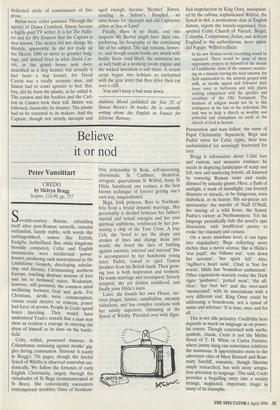Believe it or nod
Peter Vansittart
CREDO Seventh-century Britain, rebuilding itself after post-Roman turmoils, remains outlandish, faintly risible, with words like outfangentheof, names like Ecfrith, Eadgifu, Aethelflaed. But, while kingdoms bloodily competed, Celtic and English monasteries were intellectual power- houses, producing such masterpieces'as the Lindisfarne Gospels, developing scholar- ship and literacy, Christianising northern Europe, teaching abstruse notions of love and sin to bemused rulers. Wodenism, however, still persisted, the common mind oscillating between God and gods. For Christians, devils were commonplace, visions could deceive or redeem, prayer had force of arrows. People in Credo spend hours kneeling. They would have understood Yeats's remark that a man may show as reckless a courage in entering the abyss of himself as he does on the battle- field.
Celts, withal, possessed humour, St Columbanus ordaining against monks' gig- gles during communion. Humour is scanty in Bragg's 756 pages, though the fateful Synod of Whitby is observed somewhat sar- donically. We follow the fortunes of early English Christianity, largely through the vicissitudes of St Bega (commemorated at St Bees). She conveniently encounters contemporary notables: Oswy of Northum- bria, polymathic St Bede, self-lacerating, charismatic St Cuthbert, theatrical, arrogant, quarrelsome St Wilfrid, bossy St Hilda. Sainthood, one realises, is the best known technique of forever getting one's own way, unquestioned. Bega, Irish princess, flees to Northum- bria from a brutal dynastic marriage. Her personality is divided between her father's martial and sexual energies and her own spiritual ambitions, reinforced by her pos- sessing a chip of the True Cross. A true Celt, she 'loved to see the shape and strokes of lines and change them into words; she loved the idea of battling against enemies, external and internal' She is accompanied by her handsome young tutor, Padric, vowed to eject Teuton invaders from his British lands. Their grow- ing love is both inspiration and torment. He wants marriage and reconquest; fiercely tempted, she yet desires sainthood, and finally joins Hilda's nuns. Later, she founds her own House, sur- vives plague, famine, cannibalism, uncanny visitations, and has complex relations with her saintly superiors, climaxing at the Synod of Whitby. Presided over with digni- fied stupefaction by King Oswy, manipulat- ed by the callous, sophisticated Wilfrid, the Synod in 664, a momentous date in English history, rejects the loosely-organised, free- spirited Celtic Church of Patrick, Brigid, Columba, Columbanus, Aidan, and delivers England to the authoritarian, more splen- did Papacy. Wilfrid reflects:
In his new Roman world everything would be organised. There would be none of those impromptu prayers so beloved of the monks of Lindisfarne, none of the summer wander- ing on a mission leaving the seed unsown, the field unattended to, the animals gorged with milk, as monks upped and followed their inner voice to barbarous and wild places seeking comparison with the apostles and cenobites of the Old Testament. The business of religion would not be in this indulgence in the fate of the individual. His task was to help a church as wealthy and powerful and triumphant on earth as the church of God in heaven.
Persecution and wars follow, the curse of Papal Christianity. Separately, Bega and Padric strive for Celtic rights, their love undiminished yet seemingly frustrated for ever.
Bragg is informative about Celtic lore and custom, and monastic routines: he excels in depicting landscapes of scarp and fell, tarn and muttering forests, all haunted by towering Roman ruins and roads, dimmed by unlucky ghosts. Here, a flash of sunlight, a wash of moonlight, can foretell disasters or miracle, or be dangerous, even diabolical, in its beauty. His set-pieces are spectacular: the murder of Niall O'Neill, the taming of a wild horse, the Synod, Padric's victory at Nechtansmere. Yet his language periodically fails the novel's epic dimension, with insufficient poetry to evoke the visionary and ecstatic.
On a more mundane level, it can lapse into slapdashery, Bega collecting more clichés than a movie actress. She is Hilda's `star pupil', she 'follows suit', 'cuts down her servants', 'her spirit fell'. Also, `Agilbert's heart sank', Chad is 'lost for words', Hilda has 'boundless enthusiasm'. Other expressions scarcely evoke the Dark Ages: 'jamboree', 'potted meat', 'the all- clear', 'her best bet' and the over-used `mesmerised', with its associations with a very different end. King Oswy could be addressing a boardroom, not a synod of saints and scholars: 'It is time, once and for all . . . .
This is not idle pedantry. Credibility here depends as much on language as on power- ful events. Though concerned with myths, symbols, rituals, Credo is not the Mythic Novel of T. H. White or Carlos Fuentes, where jaunty slang can sometimes reinforce the numinous. It approximates more to the adventure tales of Mary Renault and Rose- mary Sutcliff, romantic, though likewise amply researched, but with more scrupu- lous attention to language. This said, Credo provides a beguiling entry into a society strange, neglected, important, tragic in many of its triumphs.


























































 Previous page
Previous page